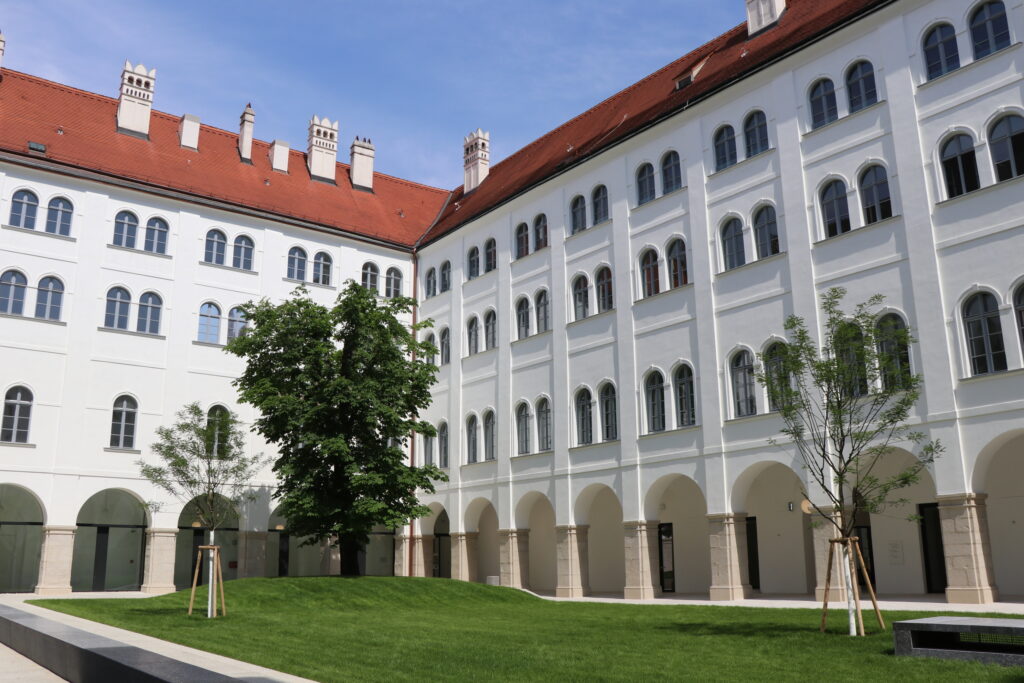EVENTS
Upcoming Events
In September 2024, a new Research Committee on “Digital Comparative Literature”(DCL) was formed as part of the International Comparative Literature Association (ICLA). In September 2025 CLS INFRA will conclude its activities.
To celebrate the concurrent creation and conclusion of these two sister projects, the SIG-DLS (now renamed “Digital Literary Studies”) organizes a mini-conference at DH2025 in Lisbon, dedicated to all applications of digital and computational methods in the study of literature.
The program (planned on Monday 14 July, 13:30-20:00 WET) will include a series of lightning talks and demos, welcoming contributions on (but not limited to) the following topics:
- Distant reading techniques and computational literary studies when applied in a comparative perspective;
- Multilingual literary archives and the digitization of texts in different languages and writing systems;
- The transformation of the book, reading in the post-digital age, and born-digital literature;
- Geographic information systems, data visualization, and comparative literary studies;
- Machine translation, artificial intelligence;
- Language models and comparative literature.
To submit a contribution for a lightning talk or a demo, please send a brief abstract via the submission form by 25 April 2025. A lightning talk is intended as a short presentation (max 5 minutes) of an ongoing or finished project, or even of an idea for possible research (if you choose this format, please submit an abstract of max 250 words). A demo is intended as a longer, interactive presentation (max 15 minutes) of a tool or workflow for digital/computational literary studies (if you choose this format, please submit an abstract of max 500 words–you can also add links to supporting materials like notebooks and/or videos). All proposals will be peer-reviewed by the programme committee and notifications of acceptance will be sent by 2 May 2025.
More information at https://dls.hypotheses.org/1903.
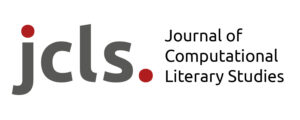
4th Annual Conference of Computational Literary Studies, Krakow 2025
The conference will take place as a hybrid event. CLS INFRA will be organising a wrap-up event of the CLS INFRA project – check back for more on that.
Presentations and participation are possible both on site and virtually.
Dates: July 3-4, 2025
Venue: Jagiellonian University, Faculty of Philology (Al. Mickiewicza 9, 31-120 Kraków)
Local Organizers: Jan Rybicki, Jagiellonian Centre for Digital Humanities, jchc@uj.edu.pl
Registration: to open at the beginning of May, 2025
Contact: info@jcls.io
Hashtag: #CCLS2025
Conference reader: to be published on June 19, 2025
check back for more events!
RECENT EVENTS
TNA Talk: Book Clubs in Journalism Culture - BoJo Club
This was a January 2025 presentation by a current fellow of the CLS INFRA Transnational Access programme (TNA), Mercedes de Luis Andrés.
Book Clubs in Journalism Culture – BoJo Club is a research project that investigates the transformative potential of book clubs within journalistic culture, focusing on their role in fostering conviviality and healing communication. By employing a social constructivist framework, the study aims to enhance the understanding of book clubs in journalism as cultural ecosystems. It explores how engagement with long-format narratives serves as a catalyst for reader memory through a series of global case studies.
Mercedes de Luis Andrés is a PhD student at the University of Klagenfurt and former Senior Scientist at the CMC of the Austrian Academy of Sciences. She completed her Bachelor’s and Master’s degrees at the University of Madrid with a stay at the University of Copenhagen. Some of her past journalism projects have been supported by the Spanish Ministry of Culture, Danish Film Directors Association and the Danish Arts Foundation. Her doctoral project is supervised by Rainer Winter (Department of Media and Communications at the University of Klagenfurt).
DH2024 CLS INFRA Poster: Literary Methods for All!
Thank you to all who visited during the poster session at DH2024. If you did not have a chance, here is the poster we presented, representing some of the work done this year!
CLS INFRA and Digital Literary Stylistics workshop at DH2024: How to do research responsibly

CLS INFRA collaborated with the ADHO Special Interest Group on Digital Literary Stylistics (SIG-DLS) to lead a workshop on responsible research at the DH2024 Conference, themed ” Reinvention & Responsibility”. Thank you to all who attended online and in person!
Program highlights:
- Keynote Amy Earhart, Ethical Datasets: Embodied Digital Approaches
- Lightning talks by Julian Häußler, Dominik Gerstorfer, Evelyn Gius, Jan K. Argasiński, Iwona Grabska-Gradzińska, Karol Przystalski, Jeremi K. Ochab, Tomasz Walkowiak, Takehiro Hashimoto, Joseph Rudman, José Calvo Tello, Nanette Rißler-Pipka, Lukas Weimer, Ubbo Veentjer, Daniel Kurzawe, Ralf Klammer, Mathias Göbel, Stefan E. Funk, George Dogaru, Stefan Buddenbohm, Florian Barth, So Miyagawa, Yuzuki Tsukagoshi , Yuki Kyogoku, Kyoko Amano, Patrick Juola, Kahyun Choi, and Florentina Armaselu
- Demo session: Joanna Byszuk, From raw texts to meaningful results: working with curated datasets
- Keynote: Artjoms Šeļa, How to do research responsibly and be bad at math?
- Open Mic
Digital Humanities and Medieval Romance Philology: Two Case Studies
Floriana Ceresato (Università di Padova) and Simone Marcenaro (Università del Molise) were CLS-INFRA Fellows at the University of Galway. They are developing two projects in the field of Digital Humanities applied to Romance Philology: while Floriana is working on a scholarly digital edition of the 13th century Franco-Italian version of the epic poem Anseïs de Carthage, Simone’s project wants to explore the challenges and opportunities posed by AI translation in the literary realm, using Medieval Galician-Portuguese poetry as a focal point. In this joint seminar, presented 3 July 2024, they introduced and discussed these projects and accompanying methodologies.
Biographies:
Floriana Ceresato is a CLS INFRA TNA fellow from the University of Padua, where she graduated in Romance Philology. She earned her doctoral degree in Lingue, Letterature e Culture Straniere at the University of RomaTre, Italy, and in Études Médiévales at the Sorbonne University, France, studying a franco-italian version of Anseïs de Carthage, a XIIIth century chanson de geste. She has worked as a researcher on medieval vernacular texts at the École Nationale des Chartes and at the Institut de Recherche et d’Histoire des Textes, in Paris. She is currently a member of the RIALFrI project (Repertorio Informatizzato Antica Letteratura Franco-Italiana) at the University of Padua.
Simone Marcenaro is Associate Professor (with full tenure) of Romance Philology at the University of Molise (Italy). He has previously worked at the Universities of Santiago de Compostela (Spain) and Milan (Italy). His main research interests are medieval European poetry, with particular reference to the Occitan and Galician-Portuguese troubadour traditions, studied from a philological and literary point of view. He is involved in international research projects, such as Cancioneros gallego-portugueses. De la Paleografía digital a la Gramática histórica (Universities of Santiago de Compostela, Vigo, Molise and Zürich), Women and Medieval Song (Universities of Barcelona and Santiago de Compostela) or Rendering Texts and Images (RETI). Digital Scholarly Editions with Edition Visualisation Technology – EVT (Universities of Pisa, Turin, Naples and Molise). He is the author of eight books and several articles in academic journals, and is currently working on the use of AI technologies to translate literary texts from the past.
TNA Research: Catching Feelings: Aspect-Based Sentiment Analysis for Fanfiction about Greek Myth
Julia Neugarten, General Cultural Sciences at Radboud University Nijmegen within the Anchoring Innovation project, is was a CLS INFRA TNA fellow at GhentCDH. Julia gave a presentation on her project “Catching Feelings: Aspect-Based Sentiment Analysis for Fanfiction about Greek Myth” on 17 June 2024. Julia and a team of researchers at GhentCDH & Lt3 mapped the ways fanfiction-readers evaluate the stories they read in the Greek mythology fandom on popular fanfiction-website “Archive of Our Own”. Using aspect-based sentiment analysis (ABSA), Julia and her colleagues examined how several aspects of fanfiction about Greek myth are evaluated by commenters. In this presentation, Julia reports on the processes of data collection and annotation for the project, introduces the different aspects, describes the pipeline for aspect-based sentiment analysis and presents some preliminary results.
UK / IE DH Conference
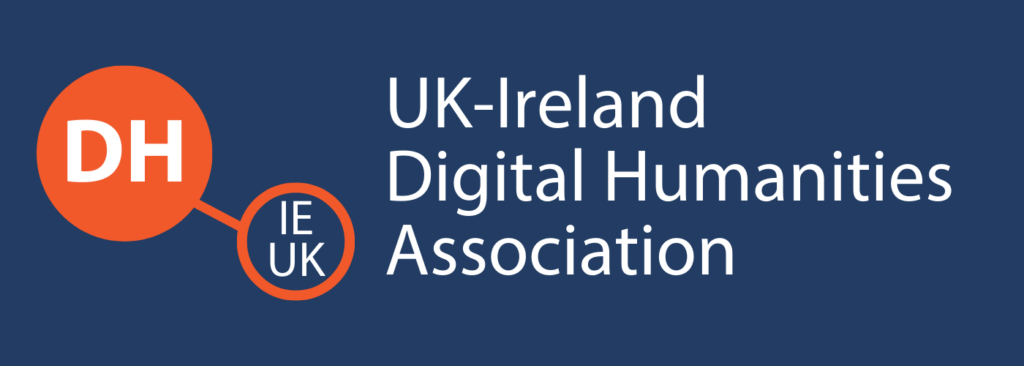
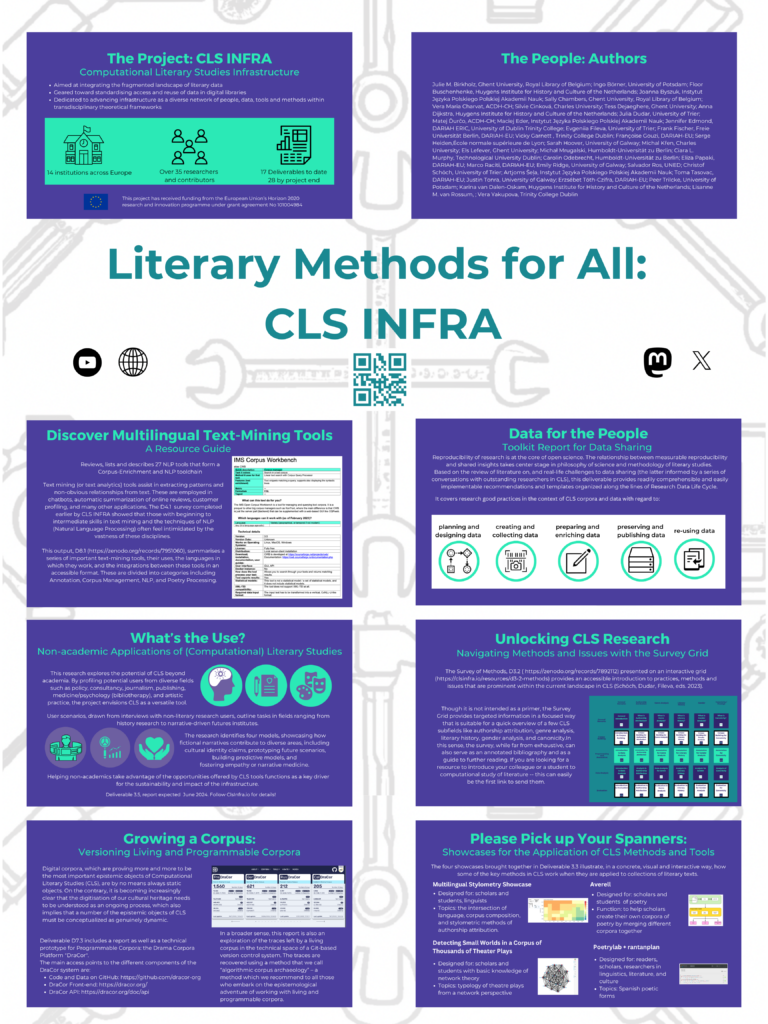
The UK-Ireland Digital Humanities Association brings together researchers, practitioners and organisations from both countries to build a collaborative vision for the field, with a focus on issues such as sustainability, inclusivity, training, advocacy and career progression. This vision for the field builds on long-standing partnerships, research, and centres of excellence to further development and innovation in digital humanities.
The 2024 Annual Event Inclusivity across Sectors / Uileghabhálacht Thar Earnálacha took place 4 – 5 June 2024, University College Cork & Online. (https://digitalhumanities-uk-ie.org/)
Justin Tonra from CLS INFRA presented the poster “Literary Methods for All“.
Presentations at DHBenelux
The annual DH Benelux Conference serves as a platform for the community of interdisciplinary Digital Humanities researchers to meet, present and discuss their latest research findings and to demonstrate tools and projects.
This year’s theme is Breaking Silos, Connecting Data: Advancing Integration and Collaboration in Digital Humanities.
DH Benelux schedule, 5-7 June: https://2024.dhbenelux.org/
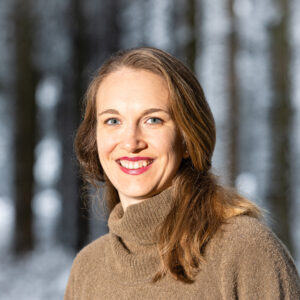
WP8 Lead Julie Birkholz presented the CLS INFRA poster Literary Methods for All during the Poster Sessions.
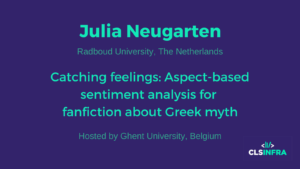
CLS INFRA TNA Fellow Julia Neugarten is a PhD candidate in Cultural Sciences at Radboud University Nijmegen on the Anchoring Innovation project (https://www.ru.nl/personen/neugarten-j). Her PhD research is about fan fiction & Greek mythology. She has an MA in Literary Studies, a BA in English and a BA in Literary and Cultural Studies from the University of Amsterdam.
During her TNA Fellowship at Ghent CDH, Julia will apply aspect-based sentiment analysis to a corpus of responses to fan fiction. This serves as one of the case studies for our deliverables in WP8. With this technique, Julia will map out how readers respond to fan fiction about antiquity, and which aspects of that fan fiction they particularly appreciate. Julia will present on these plans at DH Benelux 2024.
LREC-COLING 2024 Conference

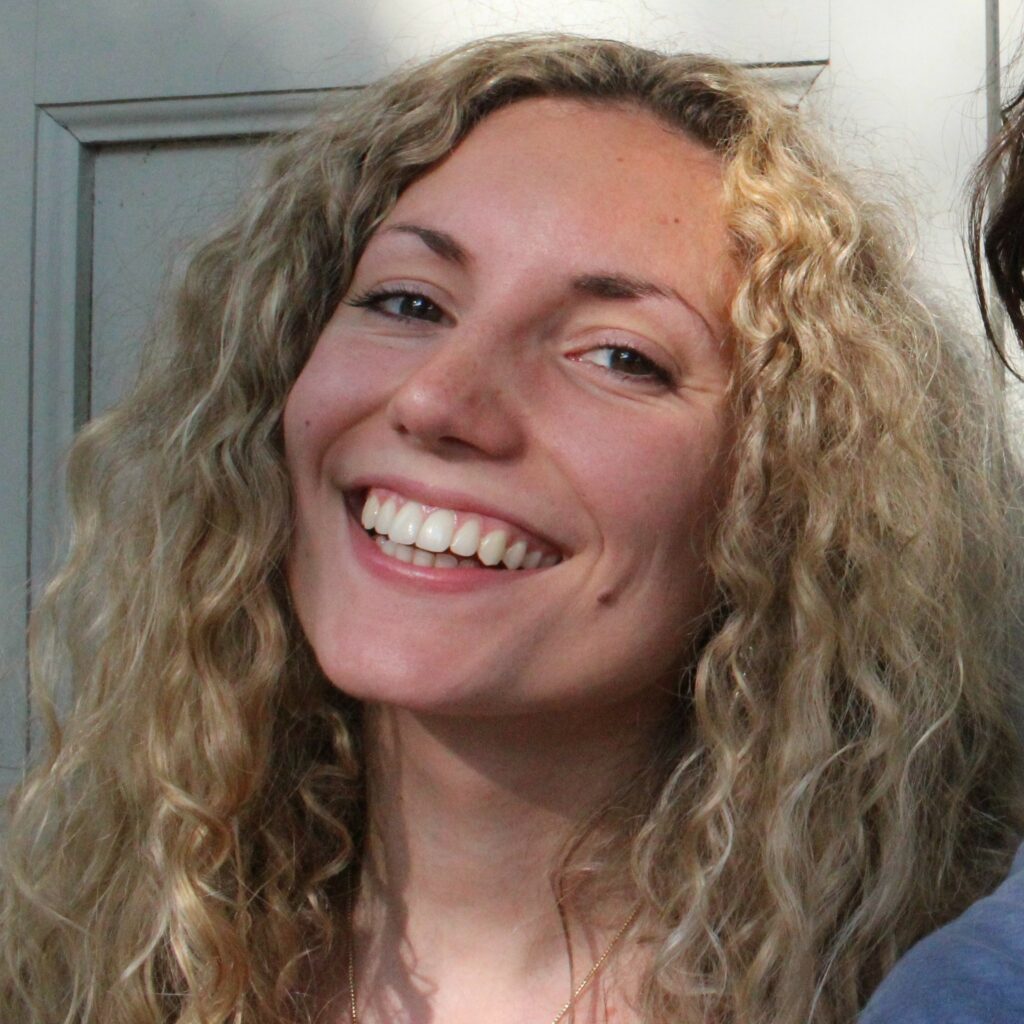
LREC-COLING 2024 – The 2024 Joint International Conference on Computational Linguistics, Language Resources and Evaluation, will take place at the Lingotto Conference Centre – Torino (Italia), from 20-25 May, 2024. The three-day main conference (22-23-24, May) will be accompanied by a total of three days of workshops and tutorials (20-21-25, May) held in the days immediately before and after.
Two major international key players in the area of computational linguistics, the ELRA Language Resources Association (ELRA) and the International Committee on Computational Linguistics (ICCL), are joining forces to organize the 2024 Joint International Conference on Computational Linguistics, Language Resources and Evaluation (LREC-COLING 2024) to be held in Torino (Italy) on 20-25 May, 2024.
The hybrid conference will bring together researchers and practitioners in computational linguistics, speech, multimodality, and natural language processing, with special attention to evaluation and the development of resources that support work in these areas.
CLS INFRA PhD researcher Tess Dejaeghere and PhD researcher Pranaydeep Singh, both from the University of Ghent, will be presenting on “Exploring aspect-based sentiment analysis methodologies for literary-historical research purposes”
TNA Fellow Seminar
Eighteenth-Century Spanish Women Writers of Irish Descent and Social Network Analysis
Patricia García Sánchez-Migallón, CLS INFRA TNA Fellow
Several women writers of recognized prestige in Spain, born during the 18th century, had Irish ancestry. The project proposes to explore, on the basis of the personal connections that can be traced through documents and literary-historical works, the different visualizations of their relationship graphs. The main hypothesis to be corroborated is whether the relationships maintained that connected them with their country of origin helped them in the publication of their works and, in each particular case, whether this help may have been motivated by the aim of disseminating enlightenment ideas. In principle, the project will focus on the figures of Margarita Hickey, Inés Joyes y Blake, María Gertrudis Hore, Frasquita Larrea and her daugther, Cecilia Böhl de Faber y Ruiz de Larrea.
Presentation: Tuesday 28 May, 2024, University of Galway
CLS INFRA Training School
June 10-12, 2024
The Annual Conference of Computational Literary Studies also takes place here on June 13-14.

CLS INFRA TRAINING SCHOOL
Digging for Gold: Knowledge Extraction from Text
Universidad Nacional de Educación a Distancia (National Open University or ‘UNED’), Madrid, Spain 9-11 May, 2023
Participants learned about SpaCy, Named Entity Recognition, and parts of speech, reading files and word embeddings. They worked with Stylometry and Natural Language Processing to complete their own analyses, and practiced visualizing the results in a hands-on way. They saw case studies of the way these skills can be used with diverse corpora and datasets. They also learned about storing information through LINDAT.
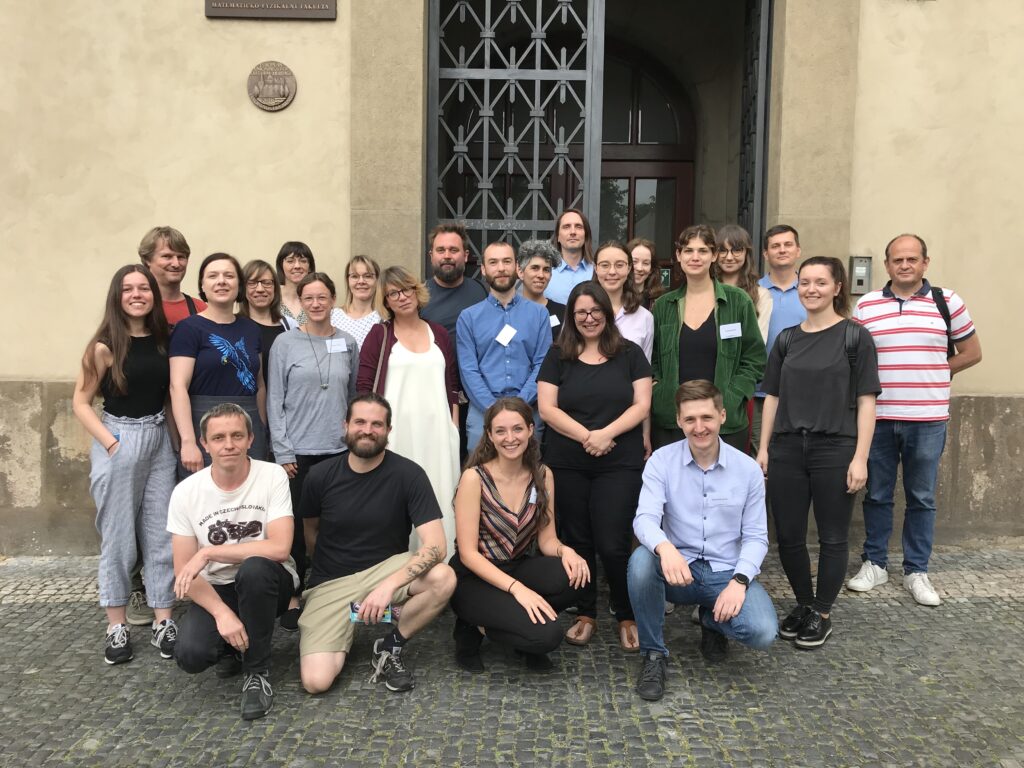
CLS INFRA Training School
DATA AND ANNOTATION
CHARLES UNIVERSITY, PRAGUE 7-9 JUNE 2022
The CLS INFRA Training School hosted 25 in person and 15 online participants from 7-9 June 2022.
Participants learned how to build, edit, annotate, and query a text corpus without a single line of code, structure texts with the XML-TEI, run an NLP tool to add linguistic information and tackle real research questions concerning Shakespeare’s dramas or other data by mastering CQL and Universal Dependencies.
Participants experienced these discipline-wide standards hands-on in TEITOK , KonText, and UDPipe .
See what our participants had to say about the Training School in our video.


